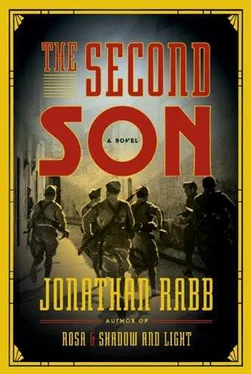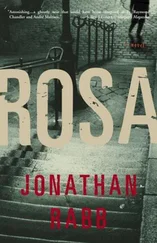Jonathan Rabb - The Second Son
Здесь есть возможность читать онлайн «Jonathan Rabb - The Second Son» весь текст электронной книги совершенно бесплатно (целиком полную версию без сокращений). В некоторых случаях можно слушать аудио, скачать через торрент в формате fb2 и присутствует краткое содержание. Жанр: Политический детектив, на английском языке. Описание произведения, (предисловие) а так же отзывы посетителей доступны на портале библиотеки ЛибКат.
- Название:The Second Son
- Автор:
- Жанр:
- Год:неизвестен
- ISBN:нет данных
- Рейтинг книги:4 / 5. Голосов: 1
-
Избранное:Добавить в избранное
- Отзывы:
-
Ваша оценка:
- 80
- 1
- 2
- 3
- 4
- 5
The Second Son: краткое содержание, описание и аннотация
Предлагаем к чтению аннотацию, описание, краткое содержание или предисловие (зависит от того, что написал сам автор книги «The Second Son»). Если вы не нашли необходимую информацию о книге — напишите в комментариях, мы постараемся отыскать её.
The Second Son — читать онлайн бесплатно полную книгу (весь текст) целиком
Ниже представлен текст книги, разбитый по страницам. Система сохранения места последней прочитанной страницы, позволяет с удобством читать онлайн бесплатно книгу «The Second Son», без необходимости каждый раз заново искать на чём Вы остановились. Поставьте закладку, и сможете в любой момент перейти на страницу, на которой закончили чтение.
Интервал:
Закладка:
Rucker’s bar hadn’t changed in nearly thirty years. Any given night it was the smell of burned sausage and over-sauced noodles that wafted out to the street and made the last few meters to the door so familiar. The sounds from inside came a moment later, old voices with years of phlegm in the throat to make even pleasant conversation sound heated. Hoffner found something almost forgiving about walking into a place where he wasn’t likely to see a face younger than fifty. Even the prostitutes had the good sense not to be too young; teasing the old with what was so clearly out of reach would have been cruel. The new girls learned to steer clear quickly enough; the ripe ones came to appreciate a clientele that preferred to talk, have a few drinks or a laugh, before trundling upstairs for more sleep than sex. To an old whore, a night at Rucker’s had the feel of a little holiday. It might not be much in the purse, but it was easy and quiet and at such a nice pace.
The barman placed a glass in front of Hoffner and pulled the cork from a bottle of slivovitz.
“Let’s make it whiskey tonight,” said Hoffner.
The man recorked the bottle, reached for another, and smiled as he poured. Hoffner took his drink and scanned the tables.
Eight o’clock was still early for the usual crowd. Dinner with the wife, followed by all that endless chatter about a day spent up on the girders or underground digging new track, could keep a man home until almost half past eight. The ones without families knew it best to straggle in even later, keep the rest guessing as to where they might have gotten to in the last few hours. The smartest always had a hint of perfume on the clothes, that watered-down swill a man could buy for himself and spray onto a collar just before coming through the door. It was the surest way to get the conversation going: “What do you mean, what do you smell?” The quick sniff of the shirt, the look of surprise, the overeager laugh, and finally the confession: “Damn me if she doesn’t use the cheap stuff!” Roars of laughter after that, even if everyone knew the game. Still, why spoil a man’s last chance at pride?
Hoffner spotted Zenlo Radek sitting in the back. Two of his men were hunched over a series of plates piled high with beef, potatoes, and sausage, while Radek glanced through one of the newspapers stacked at his side. Radek might still have been somewhere in his early forties-maybe even late thirties-but his face had long ago given up on youth. It was its lack of skin, or rather the stretching of the skin across the bones, that made it so perfect for the surroundings: gaunt and pale blurred even the sharpest of eyes. Then again, it might have been his homosexuality. That aged a man, too.
Radek continued to read as Hoffner drew up.
“The streets won’t be nearly as safe now,” Radek said, flipping the page. He had unusually long thin fingers. “But I’m sure they sent you off with something nice. A cigarette case, a gold watch. Let you listen to the time slipping by. Tick, tick, tick .”
Hoffner was never surprised by what information Radek had at his disposal. “Never took you for the sentimental type.”
“Don’t confuse pity with sentiment, Nikolai.” Radek closed the paper and looked up. A taut smile curled his lips, but the eyes told Hoffner how glad Radek was to see him. “And here I thought you might not be putting in an appearance before your trip.” Hoffner looked momentarily confused, and Radek said, “Toby Mueller. He’s got a plane all gassed up out at Johannisthal. Heading off to Spain, I hear, and with you in tow. Daring stuff, Nikolai.”
Or maybe there was room for surprise. Hoffner had to remind himself that as Pimm’s onetime second-and now boss of the city’s most notorious syndicate-Radek was tapped into every conduit in Berlin. Even the Nazis came to him when they needed information. There was talk, of course, that Radek had been the one to give Pimm up to the SS-“Make it quick, painless, a single shot to the head”-but that was absurd. It might even have been insulting. Truth to tell, Radek had never wanted this. He was simply too smart, and too loyal, not to be the one to take it all on in the end.
“Running the Immertreu,” he had once joked to Hoffner, drunk. “Tell me, if I’ve been spending all this time trying to kill myself, isn’t this a much better bet than the needle ever was?”
As it turned out, Radek had proved too resilient even for heroin. It was years now since he had lost himself to the attic rooms on Frobel and Moll Strassen. The rooms were long gone-who among the war-ravaged was still alive to fill them? — but Radek had given them a good try: veins streaked that deep pumping blue, boys at the ready for whatever was asked of them, and always the empty hope that he might somehow forget he was no longer a man-images of a single grenade rolling through the French mud, skin and trench wood flying everywhere, and his trousers drenched in blood.
The medics had saved him. Of course they had saved him. Keeping death back had become such an easy thing, just as easy as teaching a man how to piss through a tube.
For now, Radek was done with death, or at least his own. Instead, he read his papers, watched his men eat, and dictated every instance of corruption in his city. And who wouldn’t call that a life?
Hoffner pulled over a chair and sat. He took a drink.
Radek said, “He won’t find it noble, you going after him, Nikolai. Georgi knows you too well.”
Hoffner set his glass on the table. “You’re giving me too much credit.”
“Am I?”
Hoffner pulled his cigarettes from his pocket. “So it’s the big ideas tonight-pity and nobility. And here I thought I’d come in just for a drink.” He bobbed a nod at the two large men who were working through their plates. “Gentlemen.”
The larger of the two, Rolf, said, “Sausage’s not so good tonight. You can have ours if you want.”
Hoffner waved over a passing waiter, ordered a plate of veal and noodles, and lit his cigarette. “You should come with me, Zenlo. Spain’s perfect for you these days. Black market and civil war. What could be better?” Across the room a woman started in at the piano.
“And deal with all that chaos?” said Radek, as he leafed through the stack. He pulled out the “BZ” . “That’s nice for a man with a truck and a cousin down at the docks. Those of us with a little more at stake have to think differently.” He found the Grand Prix results and folded back the paper. “The desperate never buy for the future, Nikolai. No market stability. Order and fear-with maybe a little strong-arming thrown in-that’s what gives you a future.” He pulled a pen from his jacket pocket. “Berlin suits me just fine right now.”
Hoffner looked over at the smaller man. “So he’s off the Freud and Jung, is he?” The man continued to sift through his plate, and Hoffner said, “Tell me, Franz, what’s he reading now?”
Franz brought a spoonful of potatoes up to his mouth. “Keynes,” he said, before shoveling it in.
This required a moment. “Really?” Hoffner said. “That’s-ambitious.” Franz chewed, and Hoffner said, “He’s getting it wrong.”
“Is he?” said Franz, swallowing. “We should all be getting it so wrong.”
Radek continued to read as he spoke. “It’s the new psychology, Nikolai. Primal urges. Consumer desires. Totted up in columns and graphs. And this time it’s all scientific. Here.” He showed Hoffner the page he was marking. “Rosemeyer and Nuvolari. Auto Union and Alfa-Romeo. Clearly the two best drivers in the world. Barcelona last month-Nuvolari one, Rosemeyer five. Nurburgring two weeks later-Rosemeyer one, Nuvolari two. A week after that in Budapest, and they’re one and two again, only this time reversed. Milan, it’s Nuvolari, and finally Rosemeyer takes the German Grand Prix last week. And on and on and on. We know there are ten other premium drivers out there every week-Chiron, Caracciola, Trossi-yet these are the two who come up with it every time.”
Читать дальшеИнтервал:
Закладка:
Похожие книги на «The Second Son»
Представляем Вашему вниманию похожие книги на «The Second Son» списком для выбора. Мы отобрали схожую по названию и смыслу литературу в надежде предоставить читателям больше вариантов отыскать новые, интересные, ещё непрочитанные произведения.
Обсуждение, отзывы о книге «The Second Son» и просто собственные мнения читателей. Оставьте ваши комментарии, напишите, что Вы думаете о произведении, его смысле или главных героях. Укажите что конкретно понравилось, а что нет, и почему Вы так считаете.












